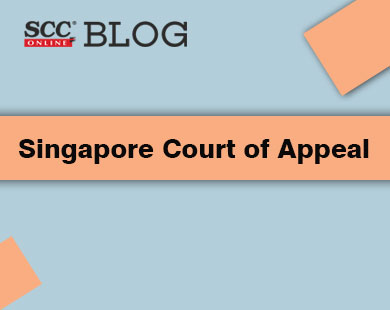Singapore Court of Appeal: In an appeal filed by Senda International Capital Limited (‘Senda’) against the order of Singapore International Commercial Court (‘SICC’) directing Senda to pay costs and disbursements in the sum of S$8.1m to Kiri Industries Limited (‘Kiri’), the Court of Appeal(‘CoA’) found no reason to interfere with the SICC’s decision. Kiri had previously succeeded in its claim of minority oppression against Senda and obtained a buyout order for its shares. Senda by way of an appeal raises questions on the way costs are to be assessed for proceedings in SICC, and as to the principles by which such ‘reasonable costs’ under Order 110 Rule 46 are to be assessed.
The CoA laid down paramount principles on the assessment of costs for proceedings in the SICC:
1. The CoA turns on the distinction between the respective approaches to costs in Order 59 and Order 110 Rule 46 of the Rules of Court (2014 Rev Ed) (‘the ROC 2014’).
(i) SICC describing the “double attenuation” of costs noted that there are two ways in which the concept of ‘reasonableness’ arises in Order 59, firstly being, the costs incurred by a party must be ‘reasonably incurred’ and secondly, the amount of the ‘reasonably incurred costs’ that are to be awarded to the receiving party must be ‘reasonable’. On the other hand, the concept of ‘reasonableness’ under Order 110 Rule 46 means there is only a single attenuation that is applied under one broad inquiry that requires the costs awarded be ‘reasonable’.
(ii) The CoA considered that the SICC erred in its understanding of ‘reasonable costs’ under Order 110 Rule 46. While analyzing the ‘indemnity principle’, it stressed the fact that the successful litigant should be indemnified by the unsuccessful party for the legal costs incurred which in turn ensures that the successful party is not prejudiced. Its function is therefore a restorative or compensatory one.
(iii) However, there are certain limits which are placed on the ‘indemnity principle’ on costs awarded under Order 59. Securing complete restoration to the full extent of the costs incurred by the successful party, will have consequences resulting into no ceiling placed on the unsuccessful party’s liability to pay costs which may discourage litigants with a potentially meritorious case.
(iv) Therefore, Order 59 focuses on the amount of cost which a successful party ought to be able to recover, while Order 110 Rule 46 concentrates on the level of costs which a successful party has reasonably incurred.
2. The CoA was of the view that it is the trial court that assesses the costs under Order 110 Rule 46 for proceedings in the SICC as it is the Judges who have heard the matter and will have the clearest sense of just how complex the matter was. There are certain factors that the trial court should consider while exercising its discretion regarding determining questions of costs.
(i)the complexity of the issues in the substantive proceeding.
(ii) the amount of costs claimed by the successful party.
(iii) the nature and extent of the differences in the respective positions on costs taken by the parties.
(iv) the need to maintain a measure of proportionality and the nature of the inquiry into ‘reasonable costs’.
(v) the corresponding level of detail involved in such an inquiry and the expense associated with such an inquiry.
(vi) amount of costs claimed by the successful party.
This stands to reason for instances when costs amount is higher in nature, the trial court must warrant more scrutiny in order to be satisfied that such costs are ‘reasonable costs.’
3. Since it is the successful party who seeks to persuade the trial court that it is entitled to be paid costs under Order 110 Rule 46 (1), the legal burden of proof lies on the same party which brings with it an evidential burden to adduce some evidence to propound the existence of the relevant fact in dispute. They should adduce evidence of information on its incurred costs and include a sufficient breakdown of such costs. It will not suffice for the unsuccessful party to make unsubstantiated contentions as to the reasonableness of the successful party’s claimed costs.
4. The relevancy of the party’s objection to the transfer of a matter from the High Court to the SICC for the assessment of costs under Order 110 Rule 46 is nil.
Thus, the CoA held that there were no valid grounds for interference with the SICC’s decision to award Kiri Industries around S$8.1 million in costs and disbursement. The CoA asserted that it is the Judges who have heard the matters and have a comprehensible understanding in relation to the intricacy of the matter and what can be considered as ‘reasonable costs’.
SICC in its decision clearly stated that the dispute in question was more complicated than usual and the degree of complexity was only heightened post-transfer and there was a need to comprehend difficulties revolving around valuation, economics, and statistics.
[Senda International Capital Ltd v. Kiri Industries Ltd, Civil Appeal No. 14 of 2022 decided on 25-11-2022]
Advocates who appeared in this case :
For the Appellant- Toh Kian Sing SC;
Cheng Wai Yuen;
Mark;
Chew Xiang;
Soh Yu Xian Priscilla;
Lim Wee Teck;
Darren (Rajah & Tann Singapore LLP);
For the Respondent- Dhillon Dinesh Singh;
Loong Tse Chuan;
Dhivya Rajendra Naidu;
Chee Yi Wen Serene;
Jung Sol (Allen & Gledhill LLP).







